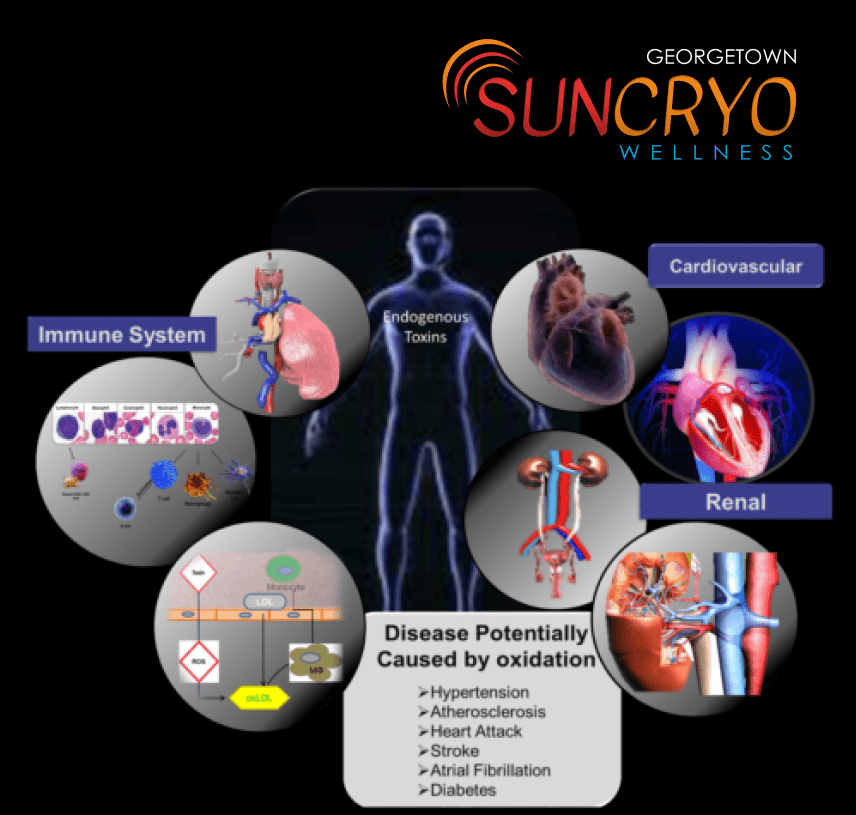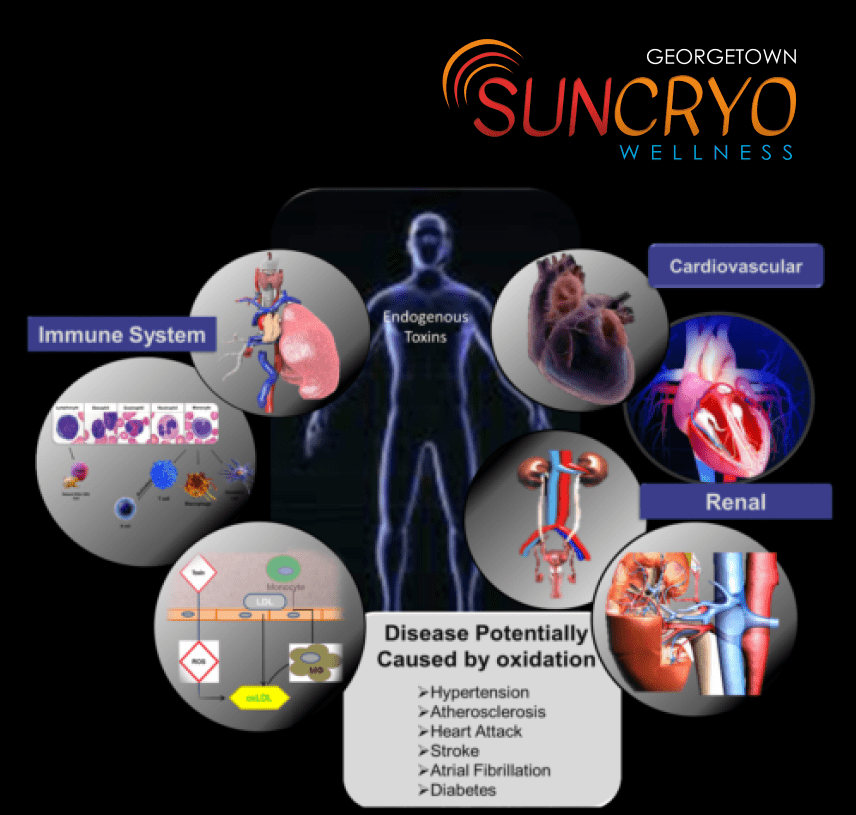Antioxidant Therapy

Oxidative stress is a physiological imbalance between the production of reactive oxygen species (ROS) and the body’s ability to neutralize or eliminate them. It plays a crucial role in the development and progression of various diseases, including cardiovascular disease, cancer, neurodegenerative disorders, and aging. Antioxidants, which are compounds that counteract the harmful effects of ROS, have gained significant attention as potential therapies to reduce oxidative stress and its associated health risks. https://georgetownsuncryo.com/
Understanding Oxidative Stress
What Are Reactive Oxygen Species (ROS)?
ROS are highly reactive molecules produced during normal metabolic processes in the body. They include free radicals like superoxide anion, hydroxyl radical, and non-radical molecules like hydrogen peroxide. ROS serves essential roles in cellular signaling and defense against pathogens. However, excessive ROS production or impaired antioxidant defense mechanisms can lead to oxidative stress.
The Consequences of Oxidative Stress
Oxidative stress can damage cellular structures, including lipids, proteins, and DNA. This damage can result in cellular dysfunction and contribute to the development of various diseases. For example, oxidative stress is implicated in the oxidation of low-density lipoprotein (LDL), which is a key event in atherosclerosis, the underlying cause of cardiovascular disease.
Antioxidants as a Therapeutic Approach
Types of Antioxidants
Antioxidants can be classified into two main categories: endogenous antioxidants, which are produced by the body, and exogenous antioxidants, which are obtained from the diet or supplements. Examples of endogenous antioxidants include superoxide dismutase, catalase, and glutathione. Exogenous antioxidants encompass vitamins (e.g., vitamin C and vitamin E), minerals (e.g., selenium), and phytochemicals (e.g., flavonoids and polyphenols). https://pubmed.ncbi.nlm.nih.gov/
Mechanisms of Antioxidant Action
Antioxidants neutralize ROS through various mechanisms, such as donating electrons to stabilize free radicals or enhancing the activity of endogenous antioxidant enzymes. By doing so, antioxidants help prevent or repair oxidative damage to cellular components.
Antioxidant Therapy: Efficacy and Applications
Cardiovascular Health
Oxidative stress plays a critical role in the development of cardiovascular diseases. Studies have shown that antioxidant-rich diets, such as those high in fruits and vegetables, can reduce the risk of heart disease. Antioxidant supplements, particularly vitamin E and vitamin C, have been investigated for their potential to protect against atherosclerosis and improve endothelial function.
Cancer Prevention
Chronic oxidative stress can promote DNA mutations and increase the risk of cancer. Antioxidants like selenium and certain polyphenols have been studied for their potential to reduce cancer risk. However, the use of antioxidants in cancer therapy remains a subject of ongoing research, as some studies have raised concerns about their potential to interfere with cancer treatments.
Neurodegenerative Disorders
Oxidative stress is a common feature of neurodegenerative diseases such as Alzheimer’s and Parkinson’s disease. Antioxidants, particularly those with neuroprotective properties like resveratrol and curcumin, have shown promise in preclinical studies. Clinical trials are underway to determine their effectiveness in slowing disease progression or reducing symptoms.
Aging and Longevity
Oxidative stress is considered a major contributor to the aging process. Antioxidant supplementation has been proposed as a means to extend lifespan and promote healthy aging. Some studies in model organisms have demonstrated lifespan extension with antioxidant treatment, but the translation to humans is still under investigation.
Risks and Considerations
Potential Side Effects
While antioxidants offer potential health benefits, excessive antioxidant supplementation can lead to adverse effects. For example, high doses of vitamin E may increase the risk of bleeding, and excessive beta-carotene intake may have harmful effects on the lung health of smokers. Therefore, it is crucial to maintain a balanced approach to antioxidant therapy.
Interactions with Medications
Antioxidant supplements can interact with certain medications, affecting their efficacy or safety. Patients should consult with healthcare professionals to ensure that antioxidant therapy does not interfere with prescribed treatments.
Personalized Approach
Individual responses to antioxidant therapy can vary based on genetics, diet, and lifestyle. Personalized approaches to antioxidant supplementation, guided by healthcare professionals, may be more effective in addressing specific health concerns. https://georgetownsuncryo.com/
Conclusion
Antioxidant therapy holds promise as a strategy to reduce oxidative stress and mitigate the risk of various diseases. While research continues to uncover the full scope of its benefits and limitations, maintaining a balanced diet rich in antioxidants from natural sources remains a fundamental approach to promoting overall health. Consultation with healthcare professionals is essential for individuals considering antioxidant supplementation, as personalized guidance can help optimize its potential benefits while minimizing risks.
